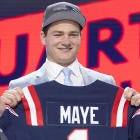
The NFL on Wednesday upheld the one-year suspension for Browns receiver Josh Gordon, meaning he's not eligible to return to his team until Aug. 27, 2015.
Although Gordon had appealed the suspension, arguing that his positive test was the result of second-hand marijuana smoke and that his positive test was only slightly above the NFL's threshold, the league apparently was unmoved.
Now, there are multiple reports, including one from Fox Sports, that say Gordon is weighing his legal options and that he might sue the league in order to be allowed to play in 2014.
What would be the basis of his lawsuit? Writes Fox: "Gordon's argument would surely be similar to the one presented in his appeal: While the 'A' sample was above the limit of what's considered a positive test, his 'B' sample was below it, with his stating any THC in his system was the result of second-hand smoke."
While Gordon was upset with the NFL's decision -- in his statement released through the union, he said, "I am very disappointed that the NFL and its hearing office didn't exercise better discretion and judgment in my case" -- he also might have an incentive not to take his case to the courts.
In its own statement Wednesday, the NFL said Gordon could apply for reinstatement after the 2014 season. Since he's technically suspended for the entire 2015 offseason and for most of Cleveland's training camp, we could take this to mean that the league might consider reinstating him earlier if he, in the NFL's mind, behaves himself.
And it goes without saying that suing the league probably wouldn't endear himself to the NFL decision-makers
But could Gordon hope for an injunction that could delay his punishment?
Writes PFT: "Any lawsuit would face an immediate and aggressive challenge from the NFL under the Federal Arbitration Act, which requires courts to respect the outcome of private litigation. Only in rare circumstances can a court throw out the results of a private arbitration procedure, and the standard for scuttling the outcome is high."





















